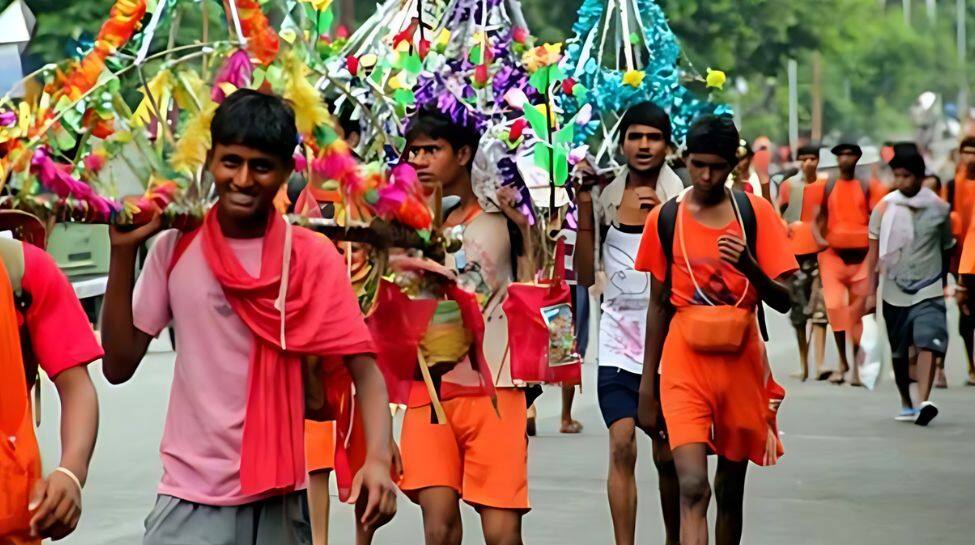The Journey of Kanwar: A Conflict of Ideologies and Cultures

As the yearly Kanwar Yatra, a pilgrimage attended by Kanwariyas, or followers of Lord Shiva, approaches, Muzaffarnagar finds itself in the center of growing sectarian conflict.
Historical Background and Diverse Population
Syed Muzaffar Khan, a Mughal leader, created the city of Muzaffarnagar in 1633, giving it historical significance. Muzaffarnagar is located in western Uttar Pradesh, India. The rich history of Muzaffarnagar is characterized by both wealth and turmoil. The city has a thriving cultural and commercial scene in addition to being a historical hotspot for considerable communal conflict. The people living in western Uttar Pradesh are Muslims, Gujjars who raise cattle, and Jat farmers. The area boasts a thriving economy fueled by the steel, paper, and sugar industries as well as some of the best mangoes, lychees, and guavas in the world, thanks to its vast orchards. Muzaffarnagar's advantageous placement adjacent to important national routes emphasizes its significance even further.
Current Events and Stress Levels
Tensions in the city have increased recently, especially during the Kanwar Yatra. The pilgrimage, which requires followers to trek great distances while bringing water from Shiva temples to the Ganga, has turned into a flashpoint for disputes between communities and politics. These tensions have been made worse by the divisive posture of the state government, which has complicated an already unstable situation.
The State Government's Order and the Reactions of the Community
The area's Deputy Inspector General (DIG) recently issued an order mandating that eateries and sellers along the Delhi-Haridwar road display their names in addition to identifying marks related to caste and religion. The purpose of this regulation was to make sure that Kanwariyas could tell the difference between businesses owned by Muslims and those that served "pure" Hindu vegetarian meals. There was a lot of opposition to the decree. Opponents contended that such actions would strengthen untouchability and further isolate Muslim communities, including some minority leaders within the BJP.
Consequences for Politics and Society
The directive has important political ramifications. The order was endorsed by the Chief Minister's office, demonstrating their dedication to safeguarding Hindu interests and establishing their authority beyond the 2024 elections. The focus on making sure that food is "kosher" for Kanwariyas draws attention to a larger tendency in which secularism and inclusivity are subordinated to religious and community exclusivity.
How Minorities Are Affected
Minority communities are affected by the nationalist and religious themes of the Kanwar Yatra. Examples from history, such the deportation of seventy Muslim families from Lucknow in 2018 as a result of police "red cards," highlight the fear and persecution minorities experience after such incidents. Minorities may feel more insecure as a result of the state's protection and encouragement of the yatra, underscoring the hazy boundaries between secular government and religious partiality.
The Greater Ideological and Cultural Disagreement
The current state of affairs in Muzaffarnagar is a component of a larger dispute in India over cultural and ideological territories. Historically, the hybrid culture has welcomed the merging of communities, languages, and artistic forms; nevertheless, groups who support racial and religious purity are putting more and more pressure on it. Marginalized populations are being forced into ghettos by this shift towards exclusivism, which is also eroding India's diverse society.
Secularism and inclusivity are seriously threatened by the emergence of sectarian and communal agendas. Demands for segregation and purity are undermining the cultural space that previously welcomed diversity and hybridization. The Kanwar Yatra dispute serves as a symbol of this broader conflict, in which customs are being appropriated for use in political and ideological conflicts.
Methodical Approaches to Handling the Emergency
Beyond simple political participation, a more complex strategy is needed to address the current issue. Recognizing and productively addressing the conflict's broader cultural and ideological components is crucial. It won't be enough to merely criticize the government or use regional and sectarian language.
A thorough plan has to include:
- Encouraging Dialogue: To resolve disputes and foster trust, promote candid and open communication between communities. This entails setting up venues for communication between communities and finding constructive ways to resolve complaints.
- Developing Secular Values: Promote inclusion and secularism in public conversation and policy-making. Make sure that laws and regulations don't feed into sectarian prejudices or societal divisions.
- Preserving Cultural Hybridization: Promote the conservation and commemoration of India's culturally diverse legacy. Encourage programs that foster respect and cultural interchange between various populations.
- Monitoring and Accountability: Put in place systems to keep an eye on how community policies are being implemented and to hold people accountable when they take actions that inflame conflict or violate rights. This entails encouraging openness in government and making officials responsible for orders that discriminate.
- Promoting Rationality and Empathy: Encourage a culture of reason and empathy in public discourse. Dismiss narratives that aim to create division among communities and advocate for a more compassionate and inclusive method of tackling societal problems.
In summary
The circumstances surrounding the Kanwar Yatra in Muzaffarnagar highlight a crucial juncture in India's continuous conflict between communalism and cultural integrity. The tension between demands for exclusivism and hybrid cultural practices is a reflection of wider ideological struggles that are changing the social and political landscape. It will take a coordinated effort to preserve secular ideals, encourage communication, and safeguard cultural variety to address these issues. In order to maintain the values of inclusivity and respect for all in the national dialogue, it is imperative that the nation deal with the complexities of the current situation in an open and proactive manner as it navigates these choppy waters.
